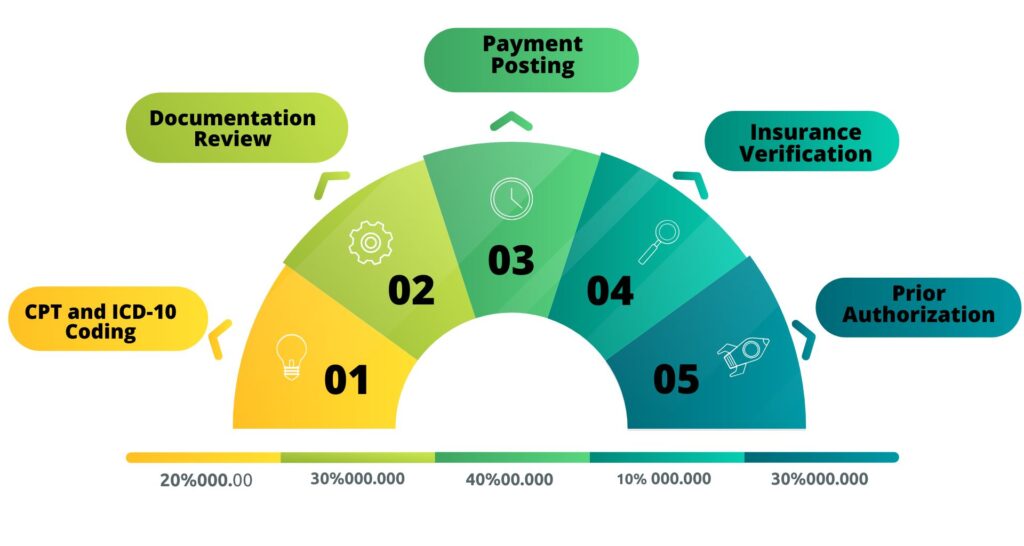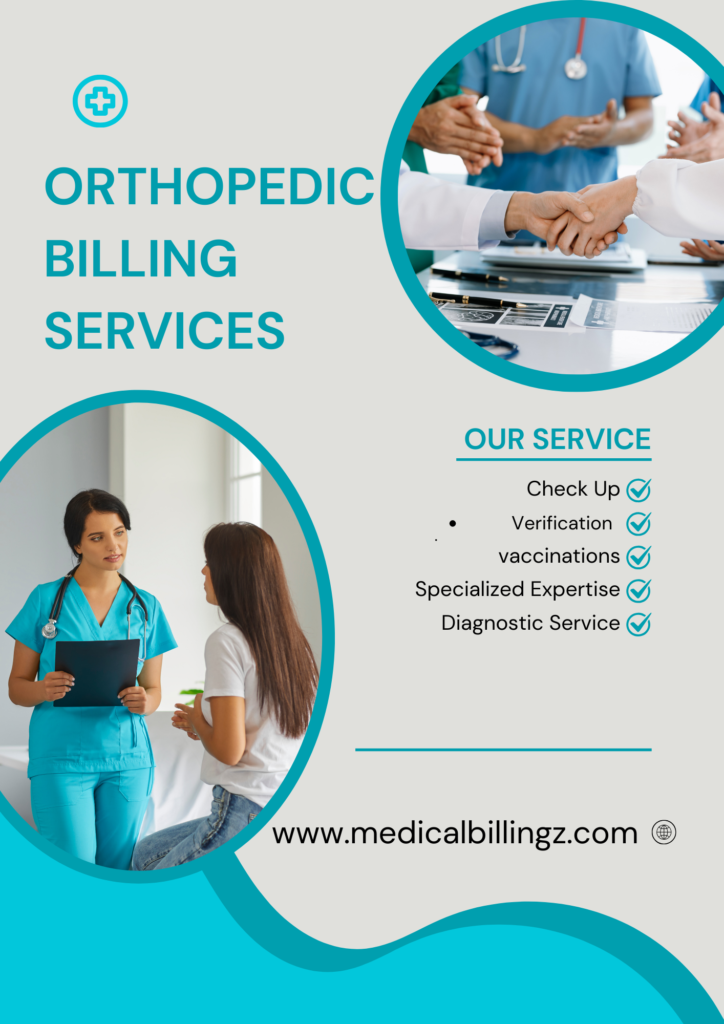Specialized medical billing procedures designed to meet the requirements of orthopedic practices are known as orthopedic billing services. Due to the complexity of the procedures and treatments associated with orthopedics, a medical specialty that treats the musculoskeletal system, accurate billing is crucial for both regulatory compliance and financial stability.
An extensive examination of orthopedic billing services, their significance, typical problems, and best practices for streamlining the billing procedure are covered in this article.
Comprehending Orthopedic Billing Services
Orthopedic billing is the process of submitting claims for services rendered by orthopedic surgeons and other medical professionals with expertise in the musculoskeletal system to insurance companies. The billing process is one of the most intricate and difficult parts of medical billing since it covers a broad range of procedures, from simple consultations to intricate surgeries.
Important Elements of Orthopedic Billing Services
Coding for CPT and ICD-10:
The medical, surgical, and diagnostic services rendered are denoted by CPT (Current Procedural Terminology) codes. CPT codes that are specific to different treatments and surgeries are used in Orthopedic Billing Services.
Wondering about outsourcing benefits?
ICD-10 Codes: The diagnosis is described using these codes. For orthopedic billing to be sure that the services rendered are suitably justified, accurate ICD-10 coding is essential.
Verification of Insurance:
To prevent denied claims, it is crucial to confirm a patient’s insurance coverage prior to providing services. Verifying the patient’s insurance information, including coverage limitations and co-payment requirements, is the task of this step.
Submission of Claims:
Claims are submitted to the patient’s insurance company following coding and verification. This is a meticulous process, as any mistakes in the submission could result in claims being rejected or being delayed.
Suspensions and Reminders:
Because orthopedic procedures are complex, it is common for claims to be denied or rejected. Maximizing revenue depends on having the ability to appeal rejected claims and conduct efficient follow-up.
The Value of Personalized Billing in Orthopedics
Orthopedic practices frequently encounter particular difficulties that call for specialist billing services. These include the intricacy of surgical procedures, the requirement for accurate documentation, and the regular involvement of several medical professionals in one case. These subtleties are understood by specialized billing services, which can assist practices in navigating them successfully.

Obstacles in Orthopedic Billing Services
Even though accurate billing is crucial, orthopedic practices frequently face a number of obstacles that could impair their revenue cycle.
Intricate and diverse processes
Orthopedic procedures can range from simple procedures to intricate surgeries. The variety of services makes coding difficult and necessitates in-depth familiarity with CPT and ICD-10 codes.
High Rates of Claim Denial
Owing to the complexity of orthopedic procedures, claims are frequently rejected for various reasons, including incomplete documentation, incorrect coding, or absence of prior authorization. The revenue of a practice may be greatly impacted by this high denial rate.
Adherence to Regulations
Orthopedic billing is subject to a number of laws and rules, such as payer-specific guidelines and those imposed by the Health Insurance Portability and Accountability Act (HIPAA). Serious fines and income loss are possible outcomes of noncompliance.
Top Techniques for Improving Orthopedic Billing Services
In order to maximize their billing processes, orthopedic practices need to implement best practices due to the intricacies and difficulties involved.
Struggling with compliance issues?
Correct Record-Keeping
Proper and thorough documentation is essential for Orthopedic Billing Services to be successful. Complete documentation of all treatments, diagnosis, and patient interactions is necessary to guarantee that claims are appropriately coded and supported.
Frequent Instruction and Training
It is imperative that billing staff receive ongoing training. This entails keeping abreast of the most recent CPT and ICD-10 codes in addition to payer-specific billing policies. Frequent education aids in avoiding common mistakes that result in claim rejections.
Utilizing Sophisticated Billing Software
Errors can be greatly decreased by investing in sophisticated billing software that can manage the complexity of orthopedic billing. The billing process is streamlined by the inclusion of features like automated coding, claim scrubbing, and comprehensive reporting in such software.
Contracting Out Billing Services
It is advantageous for many orthopedic practices to contract with businesses that specialize in medical billing to handle their billing needs. In addition to lowering overhead expenses, outsourcing can increase claim accuracy and guarantee adherence to current regulations.

Technology’s Place in Orthopedic Billing Services
In order to improve the effectiveness and precision of orthopedic billing services, technology is essential. Technology has completely changed the way that billing is done, from automated coding systems to electronic health records (EHR).
Health Information Technology (EHR)
EHR systems facilitate the documentation process by streamlining it and making it simpler to obtain all data required for billing. Additionally, they interface with billing software to guarantee accurate and current data, hence lowering the possibility of errors.
Software for Automated Coding and Billing
The amount of manual work needed in the billing process can be greatly decreased with automated coding systems. By matching procedures with the appropriate CPT and ICD-10 codes using algorithms, these systems reduce coding errors and expedite the billing process.
| Reason for Denial Percentage |
| Coding Errors 35% |
| Insufficient Documentation 25% |
| Lack of Prior Authorization 20% |
| Non-Covered Services 15% |
| Other 5% |
Reporting and Analytics for Data
Advanced billing software frequently has reporting and analytics tools that shed light on the financial performance of the practice. Practices can pinpoint areas for improvement and streamline their revenue cycle by examining claim denial rates, reimbursement trends, and other critical metrics.
Conclusion
In conclusion, Orthopedic Billing Services are essential to an orthopedic practice’s capacity to make money and run smoothly. Accurate billing is crucial due to the complexity of procedures, the requirement for exact documentation, and compliance with regulations. Adopting best practices can help practices minimize claim denials and maximize their revenue cycles.
Some of these practices include precise documentation, frequent staff training, and the use of cutting-edge billing software. Outsourcing billing services to specialized businesses can also improve financial performance, accuracy, and compliance. In the end, effective orthopedic billing guarantees that medical offices can concentrate on providing high-quality patient care while still having a strong financial base.
FAQs
What advantages come with contracting out billing for orthopedics?
Reduced overhead expenses, improved claim accuracy, adherence to regulatory changes, and expedited billing are all possible benefits of outsourcing. The intricacies of orthopedic procedures are handled by specialized billing firms with experience, which can improve practices’ bottom lines.
What qualities ought to an orthopedic billing service provider have?
When selecting a provider, consider factors like regulatory compliance, a track record of lowering claim denials, familiarity with CPT and ICD-10 coding, and experience with orthopedic billing. Take into account how they employ technology as well as the quality of their customer service.
What distinguishes general medical billing from orthopedic billing?
Because orthopedic procedures, including surgeries and fracture care, are complex and varied, orthopedic billing is more specialized. It is frequently necessary to use specialized orthopedic billing services because this calls for a deeper understanding of particular coding and billing requirements.

